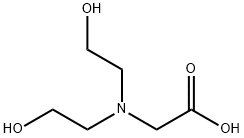N,N-Bis(2-hydroxyethyl)glycine , 10mMinWater , 150-25-4
Synonym(s):
N,N-Bis(2-hydroxyethyl)glycine;BICINE;N,N- bis-(2-Hydroxyethyl)glycine;N,N-bis-(2-Hydroxyethyl)glycine;N,N-Bis(2-hydroxyethyl) glycine
CAS NO.:150-25-4
Empirical Formula: C6H13NO4
Molecular Weight: 163.17
MDL number: MFCD00004295
EINECS: 205-755-1
| Pack Size | Price | Stock | Quantity |
| 1ml | RMB159.20 | In Stock |
|
| others | Enquire |
PRODUCT Properties
| Melting point: | 190 °C (dec.)(lit.) |
| Boiling point: | 290.25°C (rough estimate) |
| Density | 1.05 g/mL at 20 °C |
| bulk density | 364kg/m3 |
| vapor pressure | 0.002-0.007Pa at 20-25℃ |
| refractive index | 1.4240 (estimate) |
| storage temp. | room temp |
| solubility | H2O: 1 M at 20 °C, clear, colorless |
| form | Powder |
| color | White |
| PH Range | 7.6 - 9.0 |
| PH | 4.0-5.5 (25℃, 1M in H2O) |
| pka | 8.3(at 25℃) |
| Water Solubility | soluble |
| λmax | λ: 260 nm Amax: 0.070 λ: 280 nm Amax: 0.040 |
| Merck | 14,1201 |
| BRN | 1769362 |
| LogP | 2.3 at 20℃ and pH7 |
| Surface tension | 72.2mN/m at 1g/L and 20℃ |
| CAS DataBase Reference | 150-25-4(CAS DataBase Reference) |
| EPA Substance Registry System | Bicine (150-25-4) |
| Absorption | ≤0.05 at 260 in H2O at 1M ≤0.05 at 280 in H2O at 1M |
Description and Uses
Bicine is an amino acid that results from amine degradation due to the presence of oxygen and/or sulfur dioxide. The amine solvents that undergo this degradation are MDEA, DEA, TEA, and mixed amine solvents containing any of these amines. As a zwitterionic amino acid buffer agent, bicine is active in the pH 7.6-9.0 range (pKa of 8.26 at 25°C). Bicine is a recommended buffer for low-temperature biochemical work. It is used for the preparation of stable substrate solution for serum guanase determination. It can be used as a nitrogenous strength enhancer to regulate cement hydration and improve cement properties. Studies have found that bicine significantly changes the morphology of portlandite crystals from a parallel-stacked lamellar shape to a distorted one and also decreases the pore size of the hardened cement paste at an early age[1]. In particular, bicine could promote the rapid formation of β-sheet-rich amyloid-β fibrils[2].
To prepare stable substrate solution for the determination of guanine deaminase. The buffer is widely used with the working concentration of 3-100mM.
Safety
| Symbol(GHS) |  GHS07 |
| Signal word | Warning |
| Hazard statements | H302-H315-H319-H332-H335 |
| Precautionary statements | P261-P280-P305+P351+P338 |
| Hazard Codes | Xn |
| Risk Statements | 20/21/22-36/37/38 |
| Safety Statements | 24/25-36-26 |
| WGK Germany | 3 |
| RTECS | MB9700000 |
| F | 3-10 |
| TSCA | Yes |
| HS Code | 29225000 |
| Toxicity | mouse,LD50,intraperitoneal,1540mg/kg (1540mg/kg),KIDNEY, URETER, AND BLADDER: "CHANGES IN TUBULES (INCLUDING ACUTE RENAL FAILURE, ACUTE TUBULAR NECROSIS)",Revue d'Epidemiologie, Medecine Sociale et Sante Publique. Vol. 10, Pg. 391, 1962. |


